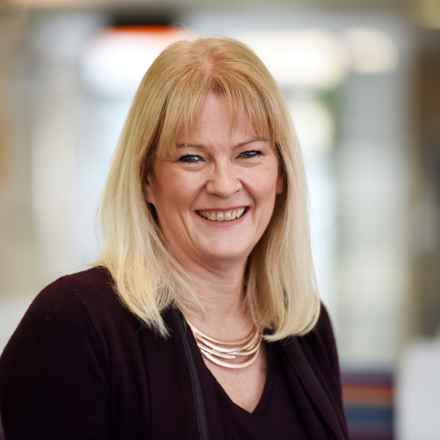‘I didn’t appreciate the longer-term emotional impact of this disease’
Posted: Wednesday 20 March 2024
Jill, a university researcher from County Durham, described how the Macular Society’s Counselling Service gave her the “time and breathing space” to adapt after a diagnosis of an extremely rare form of macular disease.
Jill said her “world shrunk” after the diagnosis, with her independence taking a significant hit, as she was forced to give up driving.
She said: “The biggest impact is not having my driving licence anymore. I feel like my world has shrunk and I have grandchildren who live up to an hour away and I can’t see them independently, so it’s had a huge impact.
“I’m now in a place where I can’t drive and I’ll be registered partially sighted.”
The 56-year-old from County Durham first noticed a small kaleidoscopic effect in her vision in 2017. After a series of tests, including genetic testing, Jill was told she had acute retinal pigment epitheliitis (ARPE), also known as Krill's disease. The rare and poorly understood condition usually affects the retinal pigment epithelium (RPE) but can also affect the macula.
For a couple of years Jill put her sight changes to one side, as she noticed no further progression and felt there was no detrimental impact from her condition.
However, in autumn 2021 her eyesight deteriorated to the point where her life began to change.
Jill said: “In March 2022 it was apparent that I was struggling with day-to-day things. I then had my driving licence revoked and I was very conscious from a work point of view that working was becoming increasingly difficult. I was struggling and really it all came to a head.”
Impact of counselling
Initially reluctant to seek support, Jill decided to reach out to some organisations which could help.
She said: “I was upset but because I’m a very pragmatic person, I can see there’s a problem to be solved or eased so I’ve gone out to get the support to help me. As soon as I knew it was causing significant problems, I immediately reached out to the RNIB, the Macular Society, HR at work and I got my Access to Work Application.”
Jill, who has a background working in mental health herself, decided to have counselling, despite being sceptical of how it would help her.
“I’m a very resilient individual but the biggest problem I had was acknowledging my own emotional and psychological state,” she said.
“My career has been about focusing on other people’s mental health, not my own, so it was a challenge to realise I had to do something about that and allow myself to feel those emotions, not put a lid on them and just focus on the practicalities. It was a challenge but that’s where the counselling really helped.
“I admit I approached it with a degree of cynicism. I thought I’d go through the motions, but it was so incredibly supportive. My counsellor got to know me very quickly and he could push me and challenge me a bit more, which is what I needed at the time. I don’t think I appreciated the longer-term emotional impact of this disease and I needed the time to adjust.
“Counselling has helped me manage. It allowed me time and breathing space to think about what was happening. As a result I realised I needed to take time off work, to take a breath and realise what was happening. I needed the downtime to come to terms with it.”
Get the support you need
To find out more about counselling service call our helpline.
Counselling
Are you dealing with the emotional challenges of macular disease? It can help to speak to a professional counsellor, who is trained to listen and to talk through your feelings and help you find ways of dealing with them. This service is for anyone who has been diagnosed with macular disease or their family members. Use our free service today.
Other support services
We provide free information and support to those with macular disease, along with their family and friends, to help people keep their independence.




